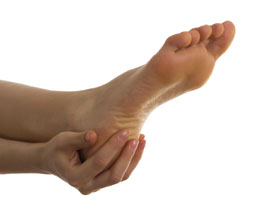Heel pain is a common foot condition, which gradually builds up and gets worse with time. This article describes the causes of heel pain, and the various methods to treat this condition.

Many times, athletes experience heel pain when running. The pain is very severe, and occurs when the weight is placed on the affected foot. There are numerous causes that may contribute to this pain. As the causes are innumerable, accurate diagnosis and timely treatment of this condition is very important. Since the feet bear the weight of your body, any foot problem can lead to complications and can result in restricted movement in the absence of treatment.
Causes
Plantar Fasciitis: Plantar fasciitis is the most common cause of heel pain. Prolonged walking and standing can also lead to this condition. Plantar fascia is the bowstring-like ligament, extended across the bottom of the foot from the heel bone (calcaneus) towards the toes. If the tissue or the ligament plantar fascia is damaged, the person experiences pain in the heels. Over-pronation, i.e., flattening of the arches, and inward rolling of the foot and ankle leads to wear and tear or inflammation of this ligament, thereby resulting in pain while running.
Heel Spurs: Heel spur is a bony outgrowth from the calcaneus. The calcium outgrowth or heel spur develops most commonly in those who tend to overuse the plantar fascia ligament. These are common in athletes who are physically very active. Obesity, as well as the use of high-heeled or ill-fitting shoes are responsible for this condition. The other causes of heel spurs are aging, constant back pain, arthritis, weak calf muscles, or poor blood circulation.
Heel Tendonitis: Achilles heel tendonitis is one of the common reasons of the pain in heel when running. Tissue bands that connect muscles to bones are called tendons, and the Achilles tendon is the largest tendon in the body, which connects the calf muscle to the heel bone. The overuse of this tendon results in pain and swelling, which is known as Achilles tendonitis. This condition can further cause small tears within the tendon, making it prone to rupture.
Cracked Heels: Cracked heels can also cause pain when running. This type of pain is common in middle-aged or elderly people. Dry skin, obesity, prolonged standing, the use of open backed shoes, and skin problems like eczema or psoriasis could be responsible for this condition. Also, dry atmosphere, keeping the feet in water for long period of time, heel spurs, excessive use of hot water, etc., can lead to cracked heels, which can give rise to pain when running.
Heel Bruise: Heel bruise may lead to painful heels. Also known as heel contusion, this condition can occur due to external injury, fracture, plantar fasciitis, or repetitive strain injury.
Tarsal Tunnel Syndrome: When the large nerve in the back of the foot becomes entrapped or pinched, it leads to tarsal tunnel syndrome, which can cause heel pain.
Stress Fractures: Stress fractures of the calcaneus are rarely noticed. However, they can be observed especially in athletes, who are long distance runners.
Treatment
Ice Packs: One can apply ice packs on the inflamed heel. This will help relieve the pain, and it is especially helpful in acute heel pain.
Rest: Pain in heels could lead to aching feet or unbearable leg pain. Hence, one should avoid precipitating activities, and take full rest. It helps eliminate pain, and is the best way to reduce the inflammation.
Medications: Usually, doctors may prescribe an anti-inflammatory drug and other medicines to control the pain and inflammation. One can also take over-the-counter painkillers.
Shoes: Wearing comfortable shoes can help solve the problem of constant pain in the heel. Shoe inserts are also often used, which permit you to continue your routine activities without any pain.
Exercise: Heel exercises can be performed to get rid of foot pain. Regular stretching of the calf muscles and the plantar fascia can also help to lower the pain.
One should consult his doctor immediately to identify the underlying cause of the pain in the heel while running. Silicone heel cups, leather heel pads, and contrasting cold and hot therapy generally helps accelerate the healing process. Also, appropriate footwear is very important. Ideally, shoes with low or moderate heels should be worn, which provide support to the heel and the arches.
Disclaimer:
The information provided in this article is solely for educating the reader. It is not intended to be a substitute for the advice of a medical expert.


 Many times, athletes experience heel pain when running. The pain is very severe, and occurs when the weight is placed on the affected foot. There are numerous causes that may contribute to this pain. As the causes are innumerable, accurate diagnosis and timely treatment of this condition is very important. Since the feet bear the weight of your body, any foot problem can lead to complications and can result in restricted movement in the absence of treatment.
Many times, athletes experience heel pain when running. The pain is very severe, and occurs when the weight is placed on the affected foot. There are numerous causes that may contribute to this pain. As the causes are innumerable, accurate diagnosis and timely treatment of this condition is very important. Since the feet bear the weight of your body, any foot problem can lead to complications and can result in restricted movement in the absence of treatment.